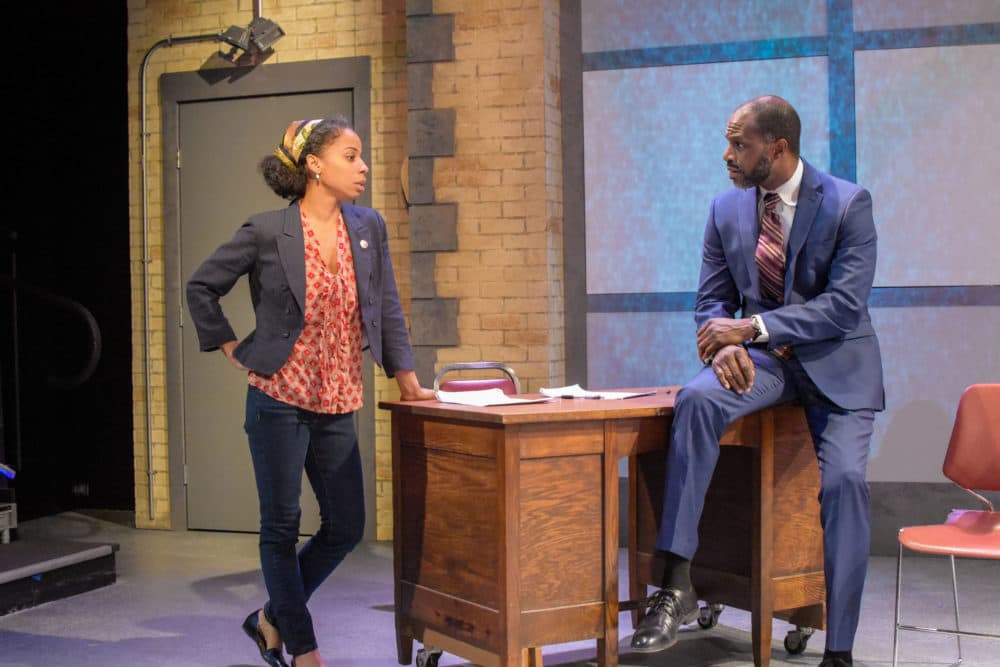Advertisement
Review
'Pipeline' Tries To Find Space For The Anger Of Young Black Men At Central Square Theater

There is a strong play straining to get out of Dominique Morisseau’s “Pipeline” at Central Square Theater (through March 29). The story of a young black man’s fury at the world he’s inherited — a split family, a prep school that he sees as racist — is alternately poetic and prosaic, artful and obvious.
Omari’s rage has resulted in his suspension from prep school — or is it the school’s racial insensitivity that resulted in his rage? Meanwhile, his mother Nya has tried to protect him against the violence in the public school where she teaches and her frustration that he may have blown his chance of escaping that world threatens to blow things up in a different direction.
Morisseau is an undeniably talented writer, a MacArthur Foundation 2018 Fellow, and the more she stays in the tradition of the artists whose works are crucial to the play — Gwendolyn Brooks and her poem “We Real Cool” and Richard Wright’s “Native Son” — the easier it is for this Nora Theatre Company coproduction with the Berkshires’ WAM Theatre to luxuriate in the material — not only in Brooks’ stunning lyricism and Wright’s tragic story but in Morisseau’s own poetic way with words. (A shoutout to Sandra Seoane-Serí as Omari's girlfriend Jasmine, who’s wonderful in every scene she’s in.)

There’s a scene in which Nya (Alexandria Danielle King) is explicating “We Real Cool” to her class (the audience) and how Harper Collins tarnished its effect by disregarding the structure she wanted on the printed page; Omari (Hubens “Bobby” Cius) is singing and dancing to the poem on another part of the stage; and the video screen underlines what the poem’s all about. Part of the beauty of the scene rests in the fact that Omari is practicing what his mother is preaching even though that’s not the path she wants for her son. “Sometimes, rules are made to be broken,” Nya says about the poem. “Sometimes the street has valuable lessons too.”
Scenes like this bring out the best not only in Morisseau's writing but in Dawn M. Simmons’ direction along with the work of the actors and the designers, particularly John Oluwole ADEkoje’s projections. In another scene, Nya tells her son all the things she would do “for you” — which could be a poem in itself, and King delivers it beautifully.
But the plot does not emerge so compellingly. Morisseau’s poetic voice gets lost in the bullet points of inner-city violence, split families, thwarted love, motherly love, fatherly frustration, race and class struggles. And the last two scenes of revelation and reconciliation seemingly come strictly out of Morisseau’s desire to build community through theater.

Morisseau, of course, has the right to use theater for whatever purposes she chooses and she boldly asserts her “rules of engagement” in the program notes, calling for the audience to be vocal in their response to what’s happening onstage. She ends by saying, “This is community. Let’s go.”
Good for her. I wish there had been more of it at Central Square Theater. But there’s still an obligation to not let agendas — whether they be community-building or political postulating — get in the way of storytelling. Many companies have made a mantra, in large part, of uniting artistic excellence with social justice concerns. Two ravishing recent examples are ArtsEmerson’s "Detroit Red," about Malcolm X’s days in Boston, and SpeakEasy Stage Company’s current production of "The Children," in which concerns about climate change never get in the way of marvelous dialogue and plotting.
Omari’s rage is not unlike Malcolm’s before he turned that rage into political resistance, though Omari’s and Morisseau’s concerns are more contemporary. “Detroit Red,” however, ends on a note of true revelation and every step on Malcolm’s path feels organic. Here it feels pretty formulaic.
Advertisement
It never feels forced or formulaic, though, when Morisseau reaches back and follows in the lyrical footsteps of Brooks and Wright. Then, it feels like there’s something special coming down this pipeline.
The Nora-WAM production of “Pipeline” continues at Central Square Theater through March 29.
